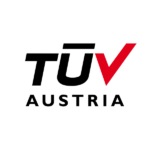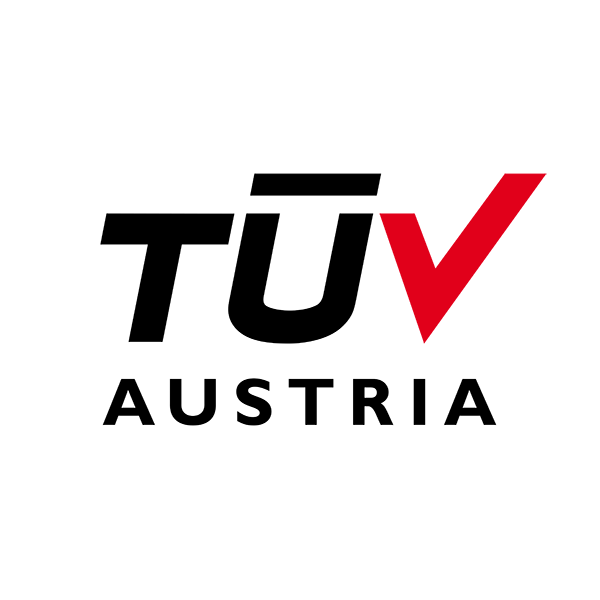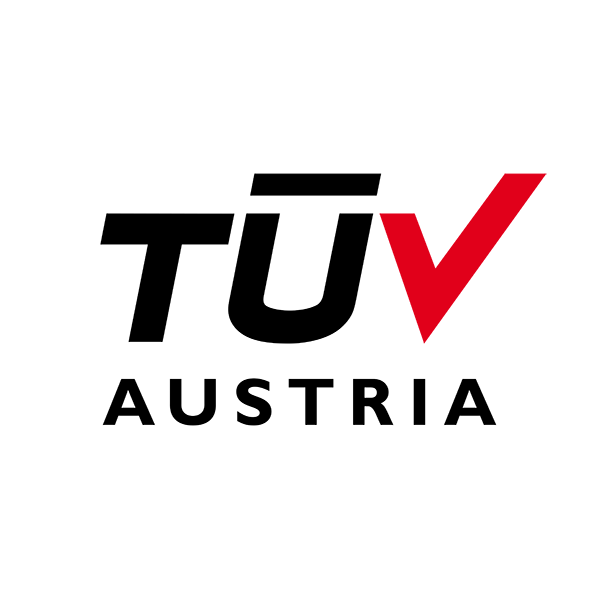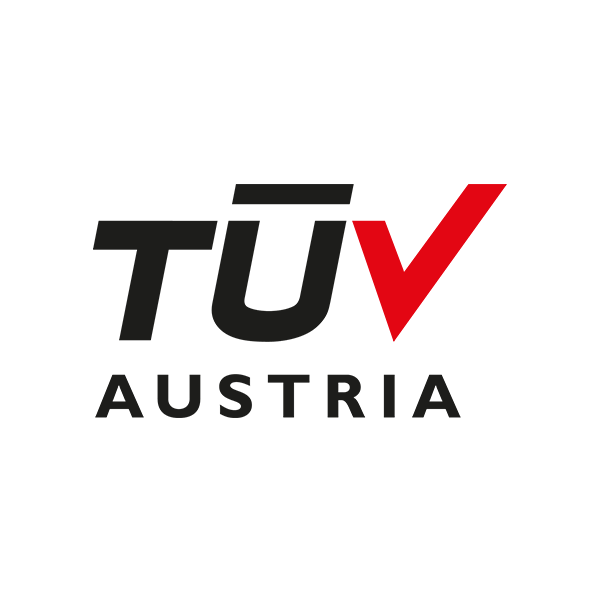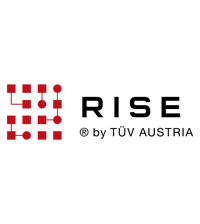Solution: Energy Management Certification | ISO 50001
Solution: Energy Management Certification | ISO 50001
TÜV AUSTRIA Energy Management Certification ISO 50001
Certification Procedure ISO 50001
- 1.
Briefing
- 2.
Commissioning
- 3.
Pre-audit (optional)
- 4.
Level 1 certification audit
- 5.
Level 2 certification audit
- 6,
TÜV AUSTRIA certificate
- 7.
Surveillance audits
- 8.
Re-certification audit
Accreditation
New ISO requirement: Climate change will be included in all management system standards
Informationen, Target Group, Requirements
The ISO 50001 is the established standard in energy management and sets the global standard for energy management certifications. With a certification according to ISO 50001:2018 you ensure that energy efficiency is systematically increased in your company, relevant energy saving potential is identified and corresponding energy-saving measures are implemented.
From microenterprises through to major industrial enterprises, from service providers to producers – across all sectors and irrespective of the type of company, you too can be certified pursuant to ISO 50001:2011.
A documented energy management system that is integrated in and practiced by the organization is required.
Your certificate is valid for three years and may be used for advertising purposes in accordance with the certification regulations.
Take a look at a sample certificate!
You are free to use the certification logo on your business stationery, website (in each case in connection with your organization), for example. Your planned use has to be approved/confirmed by the certification body for legal reasons.
Advantages
- Fulfill environmental policy requirements and surpass your customers’ wishes for greater energy efficiency! Certifying your energy management system helps with the systematic review of your energy data, the analysis of your energy costs as well as the formulation of efficient energy-saving measures.
- A functioning energy management system leads to a reduction of the energy consumption, energy costs as well as CO2 emissions through process optimizations. Certified companies are always a step ahead of the rest through coordinated processes and continuous improvement measures for energy efficiency.
- Sharpen your employees’ awareness by bringing clarity to the goals, processes and responsibilities of your energy management system and ensure practiced energy management.
- Find the right balance – with experts from TÜV AUSTRIA. Documentation for the sake of documentation? An energy management system can only work effectively if it serves the company. Our auditors create the greatest possible benefits from auditing and certification for you.
- Since the energy management system according to ISO 50001: 2011 is based on the High Level Structure, it can easily be integrated into existing systems, thus making the best possible use of synergy effects.
- A certification according to ISO 50001: 2011 by TÜV AUSTRIA provides official proof of your commitment in the field of energy management and thus strengthens the trust demanded by the market in your services, products and organization.
Certification Procedure ISO 50001
A certification process usually takes between three and five weeks. We already take your individual needs and the urgency of the certification into account during its planning. We will determine the exact effort as well as the duration and costs together with you before the certification process. This is why every certification process begins with a briefing.
1. Briefing
We will explain the procedure to obtain your certificate in a non-binding and free meeting. Amongst those items that will be clarified in this meeting are:
- Basis requirements for your certification
- Goals and benefits of the certification
- Comparison of the business data and definition of the scope of the certification
- Discussion of your specific needs and wishes
- Determination of the next steps that are needed for the certification
You will then receive an individual offer that is tailored to your organization on the basis of this briefing.
2. Commissioning
If our offer meets with your approval, the certification body is commissioned. Once you have received confirmation of your order, the certification process begins with a joint agreement of the timetable with the responsible auditor(s).
3. Pre-audit (optional)
A pre-audit can be carried out on request. However, this is not an essential requirement for certification.
Either specific areas and/or processes or the overall situation in your organization will be audited on the basis of a jointly defined framework. Any weak spots in the documentation and implementation of the system will be identified here. A pre-audit can provide you with a status report regarding the basic suitability for certification, a detailed expertise on individual processes or the conformity with individual requirements of the respective standard on request. The audit method hereby corresponds to that of the certification audit.
4. Level 1 certification audit
The level 1 audit serves to determine whether you are suitable for certification. Location-specific conditions are assessed and any necessary information with respect to the scope is collected. The level 1 audit primarily deals with the following main points:
- Verification of the documentation for conformity and completeness compared to the requirements of the standard.
- Status of the implementation of the management system within the company: Does the existing management and the level of implementation of the management system in the organization allow a certification in principle, or are any crucial details missing?
Before the level 2 audit is performed, an audit plan for the actual certification audit will be drafted on the basis of knowledge gained of your organization and the management system and jointly agreed upon with you.
5. Level 2 certification audit
During the level 2 audit, the efficacy of the management system in place in your company will be verified. Random checks will hereby be made with respect to all of the requirements in departments and organizational units as well as along the process chain.
This audit is based on:
• The audit plan
• The respective certification standard and/or individual standard requirements specified therein
• Organization-specific documents
• General and industry-specific principles (laws, additional, industry-specific, necessary standards…)
Following an analysis and assessment of the results, you will be informed of the outcome of the audit and any deficiencies or deviations during the final review. Corrective measures will be specified in the event of deficiencies. Subsequently, a root cause analysis and any specific documented measure will once again be verified by the audit team.
6. TÜV AUSTRIA certificate
The actual certification will be issued by the certification body of TÜV AUSTRIA following a successful audit and reporting on the basis of the audit report. Provided the following certification requirements have been satisfied, there is no reason why the certificate should not be issued promptly:
• Documentation and implementation of the management system
• Certification agreement (confirmation of the certification offer, the certification regulations and the T&Cs )
• Positive outcome of the audit and thus a corresponding recommendation by your audit team to the certification body
A certificate will be issued for a period of 3 years. In order to maintain the validity of the certificate over its entire term, an annual surveillance audit has to be performed with a positive outcome (12 months and 24 months after the certificate has been issued).
7. Surveillance audits
The annual surveillance audit verifies the efficacy and further development of the management system through random sampling. Surveillance audits are shorter than a normal audit and cover the deficiencies discovered in the last audit along with various key points of the requirements in the standard.
8. Re-certification audit
This has to be carried out before the certificate becomes invalid (usually after three years). In a re-certification audit (often also referred to as a repeat audit), all of the requirements are checked at random, the same as for a certification audit. The effort involved for this repeat certification audit is less than that for an initial certification (approx. 2/3 of the time needed for an initial certification audit).
Following a positive decision on the certification, a new certificate valid for a further three years will be issued that also has to be confirmed by an annual surveillance audit.
